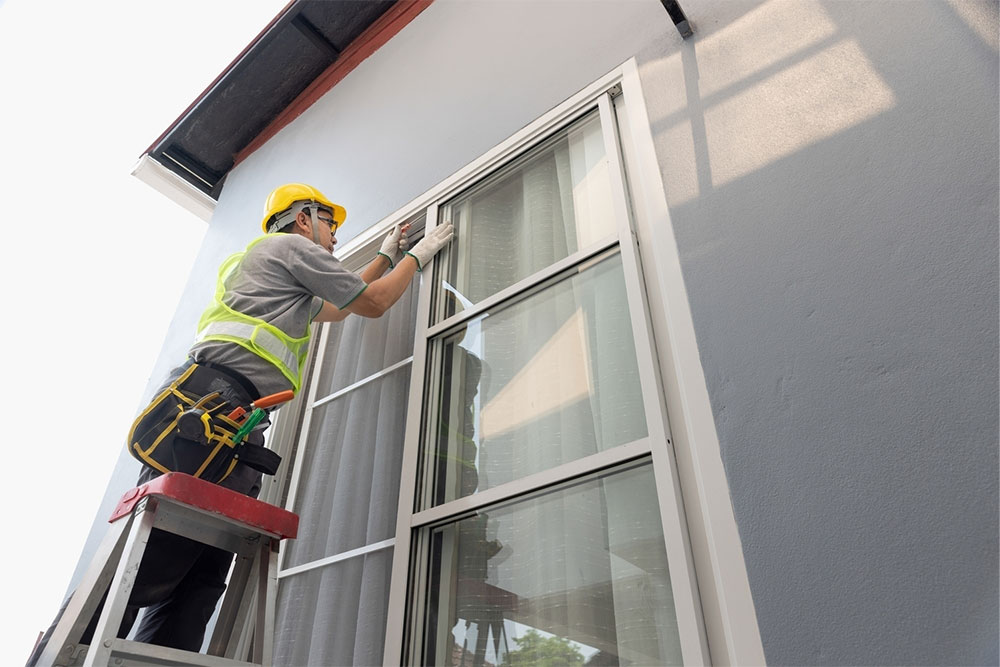
10 door and window maintenance errors to avoid
All fixtures, furniture, and appliances in a home require regular upkeep. Here, windows and doors also need cleanup and maintenance to prevent cracks, wear and tear, and drafts. Further, a problem in the windows and doors of a house could affect insulation and temperature regulation. However, one may make a few mistakes that can worsen the problems. So, here are some such errors to avoid with door and window maintenance:
1. Irregular cleanup
Doors and windows can quickly accumulate dust, grime, and other debris. Not cleaning them regularly not only makes them look dirty but can also affect their functionality. Dirt and debris on the door and window frames and tracks can hinder their ability to open and close smoothly. Further, certain parts can get corroded, also limiting the ability of doors and windows to open and close with ease. Regular cleanups can keep such issues at bay.
2. Ignoring signs of damage
One of the most common mistakes one could make with doors and windows is ignoring clear signs of damage, like cracks, warping, and chips. Such issues must be addressed immediately to prevent moisture damage and structural damage. If left unchecked for a long time, minor issues can become huge problems that can be expensive to repair. Alternatively, one may have to replace the windows or doors completely, which can be an expensive affair. So, one should address all issues immediately.
3. Not inspecting locks
Damages are not limited to hinges, frames, and tracks of doors and windows. The locks can also require repairs and maintenance. An issue with the door lock could put the house at risk, being easy to break into. Moreover, a window lock that is compromised could also hamper its ability to keep the frame up in place. This could also make the home vulnerable to break-ins or could lead to accidents while closing the window. So, one should keep an eye on locks and fix any issues in the locking mechanism to keep homes safe.
4. Using harsh cleaning products
While cleaning doors and windows regularly is essential, one should also ensure they use the right materials for the job. Harsh cleaning solutions and supplies can corrode or damage the windows and doors over time. One must opt for gentle cleaning solutions and soft microfiber cloth or paper towels to keep windows and doors dust-free. The right products do not lead to scratches or chips on surfaces.
5. Using excessive force
Opening and closing the door or windows with excessive force could damage the frames, other hardware, and tracks. If the parts are well lubricated and maintained, one should be able to open and close a door with ease. One must ensure they operate the windows and doors gently and avoid slamming or yanking them. Upon experiencing trouble opening or closing them, one should look for obstructions or debris in the tracks or hinges.
6. Not lubricating moving parts
Doors and windows have multiple moving parts, such as hinges, locks, and rollers. Manufacturers and professionals may lubricate these parts when they are freshly installed in a home. However, the lubrication goes away with time, which could affect the door or window’s ability to function properly. This means one should consider oiling these parts from time to time. Without lubrication, the parts may wear out more quickly and may need to be entirely replaced. To avoid such issues, one should oil moving parts at least once a year with a silicone-based lubricant.
7. Not sealing cracks and gaps
Windows and doors can develop cracks and gaps over time. However, neglecting to seal these areas could lead to air and water leaks and drafts. So, moisture can seep into the home or frames themselves, increasing the risk of rot and mold. To avoid such issues, one should seal any gaps or cracks around the doors and windows with weatherstripping or caulking. Keeping an eye out for these problems can help prevent mold growth and other serious damage to the doors and windows.
8. Not hiring a professional
DIY door and window maintenance or repairs can be rewarding and cost-effective. However, certain repairs may require the skills of a trained professional. For instance, one might be better off hiring a contractor when it comes to replacing the doors, windows, and frames. Trying to do it themselves may lead to lapses or damage, fixing which could lead to higher costs. Moreover, major repairs require the use of heavy-duty equipment, which one may not have at home, or, one may not have prior experience in using such tools. Here, calling in a professional can ensure a hassle-free repair process.
9. Ignoring condensation
Condensation between the panes of glass on windows or doors might be brought on by the lack of ventilation around the edges. It may also develop due to moisture build-up because of improper installation, sealant failure, or use of poor-quality insulation material, which lets moisture-filled air inside the home during warmer months. One must pay close attention to condensation, as it can lead to mold growth.
10. Choosing low-quality products
When replacing door or window hinges, rollers, or locks, one must avoid choosing low-quality hardware. While they might be more affordable, poor-quality products usually do not last long and will require frequent replacements. So, one should consider investing in good-quality hardware offered by reputable brands to enhance the durability of windows and doors.


